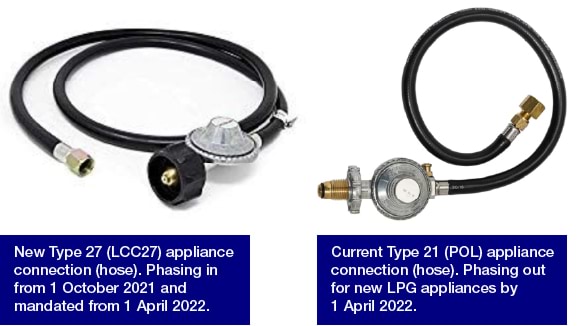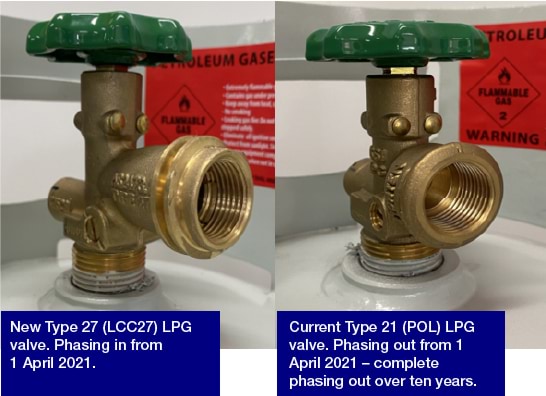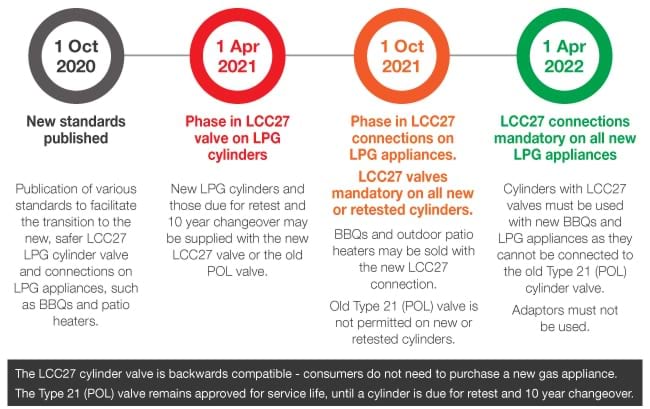BBQ gas cylinder changes
New safer valves on LPG cylinders
After 1 April 2022 all new appliances must be supplied with the new connection; only appliances made before this date can still be sold with the old connection.
When you next exchange your BBQ or outdoor gas appliance LP Gas cylinder, you may receive a cylinder with the new valve.
You won’t need to replace your BBQ or outdoor gas appliance as the new 'LCC27' valve will safely and easily connect to the hose on your existing BBQ.
The LCC27 valve is being introduced to improve safety and reduce the risk of BBQ fires and accidental gas leakage from LPG cylinders. A timeline of these changes is shown below.
Cylinders with the current 'Type 21 (POL)' valves may continue to be used. These valves will be phased out over a ten-year period as each LPG cylinder is due for a retest or ten-year change over.
After 1 April 2022, all newly made BBQs and gas appliances must be sold with new hose fittings (or connections), specifically designed for the new LCC27 valve on gas cylinders.
The new LCC27 valve is safer
Features of the new valve:
- Gas will not flow unless the valve is connected to your BBQ’s hose assembly. This means gas cannot flow from the cylinder even if the hose has been disconnected and the valve handle has been left in the open position.
- The rubber seal is protected from exposure inside the cylinder valve and, so it is less likely to deteriorate and need replacing and can be checked during refilling of the cylinder.
- When used with an LCC27 appliance connector, a thermal cut-off in the new appliance connection will stop gas from flowing if there is a fire.
New BBQ hose connections
All new appliances sold must be fitted with new connection.
From 1 April 2022 the new connection will be mandatory on all new BBQs, patio heaters and other outdoor LPG appliances with a hose assembly manufactured after this date. Refer to the transition timeline below for details.
The new LCC27 hose connection (refer to the image below) has been designed specifically for the LCC27 valve and contains the thermal cut-out feature to stop gas from flowing if there is a fire.
The new appliance connection attaches to the new valve using the outside thread, rather than the inside. It is easier to attach due to the large plastic nut and is screwed on in a clockwise direction.
Don’t use adaptors
If you have a new BBQ or appliance with the new connection, you must not use an adaptor to connect to the old Type 21 or POL cylinder connection.
Adaptors are an additional leakage risk and the change from right hand thread on the appliance LCC27 connector to left hand thread on the POL cylinder valve means tightening one side of the adapter risks creating a new leak at the other end of the adaptor.
LCC27 and POL appliance connections
Connecting your BBQ or patio heater
Your current BBQ will connect to the new LCC27 valve.
The new LCC27 valve looks different to the current POL valve (refer to the image below). It has both an inside and outside thread, ensuring it is compatible with all existing and future BBQ and LPG appliance connections. You do not need to buy a new BBQ or patio heater to use the new LPG valve,
To connect to your current LPG appliance, simply screw your BBQ or gas appliance hose end into the inside threaded opening of the valve in anti-clockwise direction, until a tight connection has been made.
LCC27 and POL valves
Always test the connection for gas leaks
- Use a squeezy bottle filled with soapy water (use dishwashing liquid and water).
- Squirt the connection with the suds from the soapy water solution.
- Bubbles will form if gas is escaping.
If there are no leaks, turn on the gas flow, by turning the valve handle (on top) in an anti-clockwise direction. Gas will stop flowing if you unscrew the hose, even if the handle has not been turned off. However, the cylinder valve handle must be closed before disconnecting the hose assembly for replacement or refilling.
Find out more about testing your BBQ connections here, and watch our Know the Drill campaign video.
Transition timeline
New LCC27 valve and appliance connections
More information
- Check out our FAQs on the new LCC27 valve and connections
- Watch Gas Energy Australia’s video on how to connect the new valve to your BBQ
- Learn about testing your BBQ connections here, and watch our Know the Drill campaign video
Date: 09/02/2026 8:42
Controlled document
The currency and accuracy of this document cannot be guaranteed once printed or saved to a storage device. If in doubt, please check the ESV website for the current version.
Reviewed


